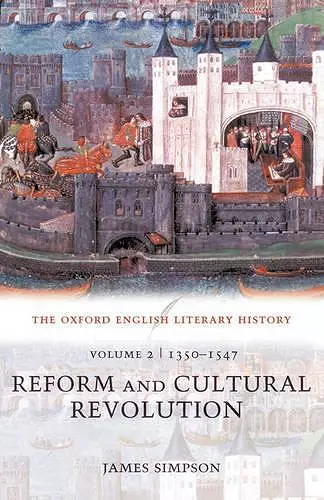The Oxford English Literary History: Volume 2: 1350-1547: Reform and Cultural Revolution
Format:Paperback
Publisher:Oxford University Press
Published:25th Mar '04
Currently unavailable, and unfortunately no date known when it will be back
This paperback is available in another edition too:
- Hardback£45.99(9780198182610)

Heralding a new era in literary studies, the Oxford English Literary History breaks the mould of traditional approaches to the canon by focusing on the contexts in which the authors wrote and how their work was shaped by the times in which they lived. Each volume offers a fresh, ground-breaking re-assessment of the authors, their works, and the events and ideas which shaped the literary voice of their age. Written by some of the leading scholars in the field, under the general-editorship of Jonathan Bate, the Oxford English Literary History is essential reading for everyone studying, teaching, and researching in English literature. Unlike most medieval literary histories, which end with the coming of the Tudors, this volume continues into the mid-sixteenth century, and registers the impact of Henry VIII's cultural revolution and the linking of Church and State after the break with Rome. Although potent traditions praise both 'Reformation' and 'Renaissance' as moments of liberation, this book argues the reverse. Simpson shows that the emergent centralized culture narrowed and simplified the literary possibilities that had been enjoyed by late medieval writers. The consequences for literature, and even for the varieties of English in which it was written, were dramatic. From roughly 1350, where the volume starts, a wide range of literary kinds flourished, in a wide range of dialects. Many of these texts can be described as a mixed commonwealth of styles and genres, such as Langland's Piers Plowman, Gower's Confessio Amantis, Chaucer's Canterbury Tales, the dramatic 'mystery' cycles, and Malory's Works. In the sixteenth century this stylistic variety gave way to a literary practice that prized coherence and unity above all. Some kinds of writing, especially romance, survived. Others, such as Langland's brand of ecclesiology, the 'Aristotelian' politics of Gower and Hoccleve, and the feminine visionary mode of Julian of Norwich, became untenable. Religious cycle drama outlived the 1530s but was suppressed within the next forty years. Sixteenth-century writing, by figures such as Wyatt, Surrey, and the dramatist John Bale, emerges in this book as the product of profoundly divided writers, torn between their commitment to the new order and their awareness of its painful, often destructive strictures.
A bold, bravura performance, and an important book ... Simpson can write with equal brilliance across both the secular and the religious. It is enormously to this book's credit that despite bearing its critical agenda on its chest, it mostly avoids predictability. James Simpson writes so well and discriminatingly that Reform and Cultural Revolution is a pleasure to read. * TLS *
A vigorous and rejuvenating study of the period. * Contemporary Review *
OELH may be an anagram of its forbear OHEL, but its agenda is very different. These are not survey volumes, and they historicize and extend the boundaries of the literary, often through attention to the impact of institutions and institutional thought on literary production. * TLS *
- Winner of Winner of the 2007 Sir Israel Gollancz Prize for English Language and Literature, awarded by the British Academy, in 2007.
ISBN: 9780199265534
Dimensions: 216mm x 138mm x 37mm
Weight: 888g
680 pages